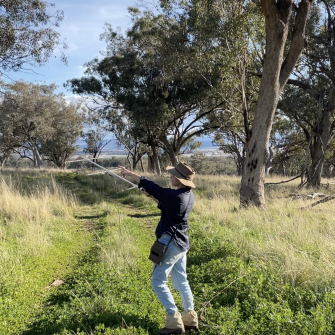Master of Clinical Neuropsychology
- Commencing Terms
- Term 1
- Duration
- 1 Year (F/T); 2 Years (P/T)
- Delivery Mode
- Face-to-face (includes blended)
- Campus
-
Kensington
- Codes
- Program code 8266
- CRICOS code 114034J
-
2026 Indicative first year full fee
- $42,000*
-
2026 Indicative full fee to complete degree
- $42,000*
-
2026 Indicative first year full fee
- $58,500*
-
2026 Indicative full fee to complete degree
- $59,500*

Application closures for 2026
International applications for all undergraduate programs, as well as postgraduate programs offered by the faculties of Arts, Design & Architecture, Engineering (excluding Master of Information Technology and associated programs) and Science are now closed to New Overseas Student Commencement (NOSC) for 2026 intakes.
Postgraduate programs offered by the Business School and the faculties of Law & Justice and Medicine & Health remain open. Master of Information Technology (and associated programs) also remain open.
- Overview
- Entry requirements
- What will I study?
- Future careers
- How to apply
- Fees & Scholarships
Overview
Seeking to upskill and widen your professional opportunities in the field of neuropsychology? This one-year full-time postgraduate degree is designed for practising clinical psychologists who want to upgrade their skills in neuropsychology.
Through supervised practice in a range of clinical settings, you’ll learn to assess and develop treatment plans for patients with developmental, neuropsychiatric, neurological and degenerative disorders. You’ll develop advanced knowledge of how neuropsychological disorders impact patients across the lifespan. And you’ll build the professional acumen to operate with autonomy and professionalism in a range of clinical contexts.
The Master of Clinical Neuropsychology is offered as a one-year, stand-alone masters, providing a pathway to gain formal endorsement as a clinical neuropsychologist.
Key features
The Master of Clinical Neuropsychology allows practising clinical psychologists to specialise in neuropsychology. The program focuses on developing clinical and professional skills to help students graduate confident, informed and job-ready.
Accredited program
The Master of Clinical Neuropsychology was developed in line with the Area of Practice Endorsement standard (Clinical Neuropsychology) of the Psychology Board (PysBA) of the Australian Health Practitioners Regulation Agency (AHPRA).
Problem-based learning
In a supervised clinical setting, students will explore fundamentals in ethics, brain function and its disorders, assessment approaches, interventions and professional issues. Weekly lectures are combined with case-based tutorials and practical demonstrations.
Career advancement
Accelerate your career in the field of psychology with an industry-recognised masters degree in clinical neuropsychology. Unlock new career opportunities and join a cohort of highly sought-after postgraduate students from a global top 20 university (QS World University Rankings, 2024–2026).
Why study at UNSW?
Global leader in psychology
The UNSW School of Psychology is one of the best in Australia. We’re ranked =#37 globally for psychology (QS World University Rankings by Subject, 2025), attracting award-winning staff and competitive funding for research and innovation.
State of the art facilities
Our teaching facilities include world-leading behavioural neuroscience and cognitive testing laboratories that allow you to design and implement your own psychological research and independently analyse cognition and brain function.
Most employable graduates
The UNSW School of Psychology has strong links with professional neuropsychology practitioners and organisations including the National Comprehensive Dementia Hub at Prince of Wales Hospital. UNSW has been awarded with the Most Employable students for six years in a row (Australian Financial Review (AFR) Top100 Future Leaders Awards, 2020–2025). You can grow your network while you study and leverage our partnerships to find a rewarding job after graduation.
Entry requirements
To be eligible, applicants must have successfully completed a 6-year APAC accredited sequence of study in psychology, including a major research thesis. All degrees must be submitted as part of your direct application to confirm your study sequence.
All applicants must currently be registered as a psychologist with the Psychology Board of Australia with Area of Practice Endorsement in Clinical Psychology, Forensic Psychology, Educational and Developmental Psychology or equivalent.
As part of your application, you must provide:
- A brief (3-page max) professional curriculum vitae/resume including relevant psychological practice, both paid and volunteer, with a brief outline of duties.
- A completed copy of the School of Psychology's Supplementary Application Form. Once completed, please save a copy of the form and upload it to your Apply Online application.
- A 1-page biopsychosocial case formulation for a de-identified client (or hypothetical client) with cognitive dysfunction.
In addition, you will need at least two professional referee reports. Your referees will submit these reports directly to the Australian Psychology Post-Graduate Program Reference Request System. This is not submitted as part of your application to UNSW.
English language requirements
Applicants must:
- Demonstrate their competency in speaking and communicating in English is sufficient to practise the psychology profession.
- Satisfy both UNSW's English language requirements and those required by the Australian Health Practitioner Regulation Agency (AHPRA).
All applicants, domestic and international, are encouraged to use AHPRA’s pathways diagram for all professions (under ‘Additional resources’) to guide their understanding of AHPRA’s requirements.
Inherent requirements
Inherent requirements are the fundamental tasks and activities needed to achieve the core learning outcomes of a course.
Before applying, it's crucial to read and fully understand these inherent requirements and think about whether you may experience challenges in meeting these requirements.
What will I study?
UNSW is introducing a new academic calendar from 2028.
We are moving to a new flex-semester calendar. What does this mean for your studies?
Program structure
The Master of Clinical Neuropsychology includes seven courses: three academic and four professionals. Each term, you'll take one academic course and one professional practice course. There's also a required professional practice course with no credit points that you take alongside your placements.
You'll study topics like disruptions, lifespan, and interventions, earning a total of 18 units of credit (UOC). The program focuses on aging and interventions, which are important health service areas. You'll also do supervised professional practice, working with real patients to assess and create treatment plans, earning 30 UOC.
The program is designed for working clinicians. Academic courses have recorded lectures and weekly case-based tutorials, which you can attend online or in person. Professional practice includes workshops and field placements. You must complete at least one field placement in Sydney, but some remote placements might be available.
Full program structure
The program consists of two components, all of which are compulsory, totalling 48 units of credit (UOC):
- Coursework
- Professional Practice
For more detailed information of the Progression Plan and Program Guide, please refer to our postgraduate coursework page.
-
Core courses:
Clinical Neuropsychology 1: Disruptions – 6 UOC
Clinical Neuropsychology 2: Lifespan – 6 UOC
Clinical Neuropsychology 3: Interventions – 6 UOC
-
Students will participate in supervised clinical practice, working to assess and treat a range of conditions. You’ll develop and complete a capstone or research project that demonstrates high-level critical thinking, research design, implementation, analysis and communication in your chosen area of clinical neuropsychology.
Core courses:
- Neuropsychology Professional and Ethical Practice 1 (NPEP1) – 6 UOC
- Neuropsychology Professional and Ethical Practice 2 (NPEP2) – 12 UOC
- Neuropsychology Professional and Ethical Practice 3 (NPEP3) – 12 UOC
- Professional Psychological Practice – 0 UOC
Future careers
The Master of Clinical Neuropsychology provides a pathway to gain endorsement as a clinical neuropsychologist from the PsyBA. As a fully-endorsed clinical neuropsychologist, you’ll gain access to a range of career opportunities within the field of neuropsychology.
You’ll be able to work in a variety of clinical settings, helping patients manage and minimise the impacts of developmental, neuropsychiatric, neurological and degenerative disorders. We’re experiencing increasing demand for qualified clinical neuropsychologists as a result of our aging population and improved NDIS funding to support the daily living skills of individuals with a cognitive impairment. Your combined clinical psychology and clinical neuropsychology training will provide a unique advantage in the job market and allow you to take up a variety of positions.
Jobs in clinical neuropsychology:
- Clinical neuropsychologist
- Clinical pediatric neuropsychologist
- Neuropsychology researcher or academic
- Director of a neuropsychology practice
Accreditation
This program is seeking accreditation by the Australian Psychology Accreditation Council (APAC) as a sixth year of study, leading to registration as a psychologist with the Psychology Board of Australia (PsyBA). Upon graduation, you’ll be eligible for Associate Membership with the APS College of Clinical Neuropsychologists (CCN).
After completing a further 18 months of supervised practice (the Clinical Psychology Registrar Program), you can apply to the PsyBA for full membership and endorsement as a clinical neuropsychologist.
How to apply
Domestic students: Applications open on 1 August 2025 and close 3pm AEDT, 31 October 2025.
Onshore and offshore international students: Applications are closed.
The application process is the same for domestic and international applicants.
1. Submit your application
- Apply online through the UNSW Apply Online service.
- Include these documents:
a. Completed Supplementary Application Form (PDF).
b. Completed transcripts of a six-year APAC-accredited psychology degree (or international equivalent).
c. Current registration as a psychologist with the Psychology Board of Australia with an Area of Practice Endorsement in any area.
d. One page biopsychosocial case formulation for a de-identified client (or hypothetical client) with cognitive dysfunction.
e. Your CV.
f. Australian Psychological Society (APS) assessment letter (for international qualifications only).
Ensure all documents are submitted by the application deadline, late submissions will not be accepted.
2. Receive acknowledgement
- You'll get an email from UNSW Admissions confirming receipt of your application.
- Complete applications will be forwarded to the School for assessment.
- Incomplete applications will be on hold until the final day of submission. Make sure to submit all documents by this date.
3. Share references
- Use the Psychology Reference Portal to share two references with UNSW.
- The School will only consider applications with two completed references.
The School will check if you meet the eligibility requirements:
If met: Your application goes to the Selection Committee.
- If not met: You'll receive an email with the outcome.
4. Shortlisting
- After the application deadline, the Selection Committee will start shortlisting.
- Applications without complete documentation will not be considered.
- The School will notify applicants if unsuccessful in being shortlisted via email.
5. Interview/Assessment Centre
- Shortlisted applicants will be invited to an interview. These interviews are typically held in November.
- Shortlisted candidates will also be asked to submit a video of a test administration. Requirements of this task will be provided with details for the interview.
6. Outcome
- Successful: The School will contact you to congratulate you on the successful outcome, then you'll receive a formal Letter of Offer from Admissions.
Unsuccessful: The School will email you the outcome, followed by formal correspondence from Admissions.
-
- Intake: Term 1 is the only available intake for this program.
- Program quotas: There are limited places available each year. Even eligible applicants might not get a place due to these quotas.
- Proof of registration: You’ll need to provide proof of registration and endorsement from the Psychology Board of Australia in your application. You can download a copy of your Certificate of Registration from the Australian Health Practitioner Regulation Agency (AHPRA), which shows your current registration and endorsement area.
- International qualifications: Must have the qualification(s) assessed by the Australian Psychological Society (APS) before applying.
- Inherent requirements: Review the inherent requirements before applying.
For more information, please refer to our FAQs.
Ready to start your application?
Applications open on 1 August 2025 and close 3pm AEDT, 31 October 2025 for domestic and onshore international students. Offshore international students must submit their application and all supporting documents by 11:59pm AEDT, 10 October 2025.
The application process is the same for domestic and international applicants.
1. Submit your application
- Apply online through the UNSW Apply Online service.
- Include these documents:
a. Completed Supplementary Application Form (PDF).
b. Completed transcripts of a six-year APAC-accredited psychology degree (or international equivalent).
c. Current registration as a psychologist with the Psychology Board of Australia with an Area of Practice Endorsement in any area.
d. One page biopsychosocial case formulation for a de-identified client (or hypothetical client) with cognitive dysfunction.
e. Your CV.
f. Australian Psychological Society (APS) assessment letter (for international qualifications only).
Ensure all documents are submitted by 31 October, late submissions will not be accepted.
2. Receive acknowledgement
- You'll get an email from UNSW Admissions confirming receipt of your application.
- Complete applications will be forwarded to the School for assessment.
- Incomplete applications will be on hold until 31 October. Make sure to submit all documents by this date.
3. Share references
- Use the Psychology Reference Portal to share two references with UNSW.
- The School will only consider applications with two completed references.
The School will check if you meet the eligibility requirements:
- If met: Your application goes to the Selection Committee.
- If not met: You'll receive an email with the outcome.
4. Shortlisting
- After 31 October, the Selection Committee will start shortlisting.
- Applications without complete documentation will not be considered.
- The School will notify applicants if unsuccessful in being shortlisted via email.
5. Interview/Assessment Centre
- Shortlisted applicants will be invited to an interview. These interviews are typically held in November.
- Shortlisted candidates will also be asked to submit a video of a test administration. Requirements of this task will be provided with details for the interview.
6. Outcome
- Successful: The School will contact you to congratulate you on the successful outcome, then you'll receive a formal Letter of Offer from Admissions.
Unsuccessful: The School will email you the outcome, followed by formal correspondence from Admissions.
-
- Intake: Term 1 is the only available intake for this program.
- Program quotas: There are limited places available each year. Even eligible applicants might not get a place due to these quotas.
- Proof of registration: You’ll need to provide proof of registration and endorsement from the Psychology Board of Australia in your application. You can download a copy of your Certificate of Registration from the Australian Health Practitioner Regulation Agency (AHPRA), which shows your current registration and endorsement area.
- International qualifications: Must have the qualification(s) assessed by the Australian Psychological Society (APS) before applying.
- Inherent requirements: Review the inherent requirements before applying.
For more information, please refer to our FAQs.
Ready to start your application?
Fees & Scholarships
*Fees are subject to annual review (or when required) by the University and may vary accordingly.
Indicative fees are a guide only and have been calculated based on the typical enrolment patterns of students undertaking the program. The indicative fees listed here is an estimate for tuition only and excludes non-tuition fees and charges. The amount you pay will vary depending on the calendar year of enrolment, the courses you select and whether your study load is more or less than 1 Equivalent Full Time Student Load (48 units of credit (UOC) per year).
You should not rely on indicative fees as fee increases are assessed when required and may exceed the indicative figures listed here. Actual fees are calculated on enrolment. More information on fees can be found at the UNSW fees website.
*Fees are subject to annual review by the University and may increase annually, with the new fees effective from the start of each calendar year. The indicative fees listed here are based on an estimated average and are for tuition only, other fees and charges are not included. The amount you pay will vary depending on the calendar year to enrol, the courses you select and whether your study load is more or less than 1 Equivalent Full Time Student Load (8 courses per year).
Indicative fees are a guide for comparison only based on current conditions and available data. You should not rely on indicative fees. More information on fees can be found at the UNSW fees website.
Indicative fees to complete the program have been calculated based on a percentage increase for every year of the program. Fee increases are assessed annually and may exceed the indicative figures listed here.
Indicative fees to complete the program include tuition plus an estimate of study-related costs of approximately $1,000 per year. To find out more about other costs, visit UNSW International.
Scholarships
At UNSW, we award over $83 million in scholarships each year. We pride ourselves on rewarding excellence and making university accessible to students from all walks of life. Whether you’re a domestic or international student, our range of scholarships, prizes and awards can support your journey.
Progress starts here – at a world-leading university

Top 20 Worldwide
UNSW is ranked #20 university in the world
QS World University Rankings, 2024–2026

Most Employable Graduates
Winner of the AFR Most Employable University Award six years in a row
AFR Top100 Future Leaders Awards, 2020–2025

Australia's #1 for Innovation
Highest number of startups and spinouts from university-developed tech
SCOPR report, 2024






